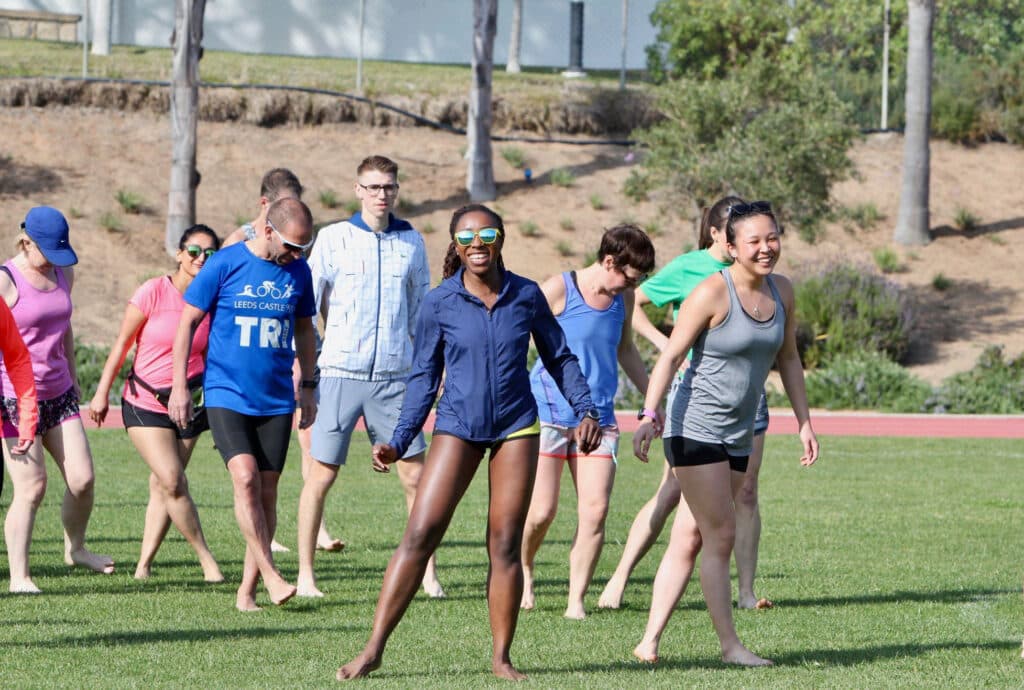


Look no further if you’re looking for a comprehensive, well-structured training plan to prepare for that big race. Our 24 week marathon training plan PDF, crafted by our very own expert Mike Gratton, a London Marathon winner (1983 with a time of 2 hours 9 minutes), is tailored to help you conquer your running goals.
This comprehensive training program is specifically designed for individuals transitioning from the Couch to 5k program to the ultimate challenge of a full marathon. It offers an effective progression to help you achieve your goals, while optimising your performance and endurance.
In this blog post, we’ll explore why this training program stands out among others in the field, along with insider tips to get you on the fast track to success!

Completing a half marathon or marathon is not just about crossing the finish line. It’s an accomplishment that requires dedication, perseverance, and mental toughness. Training can present challenges, yet it is also extremely rewarding. Not only does it improve your physical fitness, but it also boosts your confidence and mental strength.
The marathon has evolved into the most glamorous event in the running world. Despite the sweat, blisters, and relentless fatigue that accompanies it, the allure of marathon running is undeniable. In recent years, this challenging yet fulfilling sport has witnessed a surge in popularity, with an increasing number of individuals embracing its demands. There are numerous factors that contribute to the widespread appeal of marathon running, captivating the hearts of countless enthusiasts.
Training for 26.2 miles is not just about physically preparing your body; it challenges you to push beyond your limits and achieve something that may have initially seemed impossible. Here are some of the reasons why training for a marathon can be a life-changing experience:

Experts recommend training four or five days a week to prepare for a marathon adequately. This schedule allows for adequate rest and recovery while still providing enough training to build endurance and strength. Our 24 week marathon training plan PDF is strategically designed to provide a mix of running workouts, cross-training, and rest days to help you optimise your training without risking injury or burnout.
With our customisable 24 week marathon training plan PDF, six months is absolutely enough time to prepare for a marathon. Our head coach, Mike Gratton, believes that six months provides an ideal balance between giving your body the necessary time to adapt to the training while preventing boredom or stagnation.
The journey begins with 8 weeks of focused aerobic training to establish a solid foundation. As you progress as a runner, the training gradually shifts towards a more specific marathon pace, tailored to your needs. During this phase, we introduce more challenging workouts, including hill running, to strengthen your legs and improve overall resilience. Simultaneously, we continue to build upon the foundation with longer runs. Afterwards, in the final phase, you will spend eight weeks incorporating faster training into your regimen. This will include running at your projected marathon pace and incorporating intervals for increased speed. Additionally, about 4 weeks before the marathon, you will aim to complete your longest long run, typically around 30km.
In the plan, we cover:
Our marathon training program is excellent for tracking your daily and weekly progress.

Our 24 week marathon training plan PDF has been designed by Mike Gratton for runners transitioning from the Couch to 5k program to a full marathon. It offers an effective progression while optimising your performance and endurance. It caters to those with busy schedules, by providing flexibility in workout days and the option to adjust the mileage according to your fitness level and help you to train properly.
This comprehensive 24-week marathon training program encompasses various forms of running and workouts, ensuring a well-rounded approach to preparation. These include:
Endurance Runs: This type of run is also known as aerobic conditioning. Endurance runs make up the highest percentage of overall mileage for a distance runner. Long runs at an easy pace are effective for improving your aerobic capacity and overall fitness. You can optimise blood flow by gradually increasing the distance and maintaining a comfortable pace. These longer runs are essential for improving your fitness level. These workouts are performed at about 55 to 75 per cent of your VO2 max (your body’s ability to process oxygen). Gradually increase your pace as the weeks progress.
Cross training: Many runners engage in cross training while preparing for a half marathon or marathon. It improves cardiovascular endurance and helps strengthen muscles. Cross training on non-running days helps to prevent injury and works different muscle groups. It can include low-impact activities such as cycling, swimming or light weights.
Interval training: Extended periods of running at a quicker speed than your marathon pace will condition the body to be able to maintain that pace for a long time. The purpose is to improve your overall pace and stamina and increase strength. Running at marathon pace can be done on a track or treadmill, and involves alternating periods of tempo pace with periods of lower intensity. Interval training helps break the monotony of long runs.
Tempo run: Tempo runs involve running for 20 to 30 minutes at a comfortably hard pace, around your lactate threshold. This is the point where you start to accumulate lactic acid in your muscles, and your body begins struggling to keep up with its rate of production. During this tempo pace workout, you improve your ability to maintain race pace and run farther on fatigued legs. A tempo run is a challenging workout and may feel like a sustained race effort.
Strength training: Strength training builds muscle and prevents injuries. It is suggested to strength train twice a week while training for a marathon. This includes exercises such as squats, lunges, planks and push-ups. These exercises work your core and lower body.
Hill running: Incorporate hill runs into your training to improve stamina and build leg strength. These workouts can be done on a treadmill incline or outdoors on hilly terrain. Hills help you work different muscles and increase your cardiovascular endurance.
Long runs: A long run is vital for endurance and preparing when you train for a marathon. It is crucial to gradually increase your long runs, slowly building the mileage each week. These longer runs should be done at an easy pace and are essential for training both physically and mentally.
Rest and recovery: Rest is an essential part of training for 26.2 miles. Your body needs time to recover and repair itself. Taking at least one rest day from running each week is suggested to allow for active recovery, where your muscles can rest and rebuild. Trying yoga or pilates can be a great way to improve flexibility and strength for runners.
Additionally, make sure you get enough sleep during this phase. A rest day is of vital importance to avoid burnout and prevent injury.
Dynamic stretching: Dynamic stretching helps improve mobility and flexibility. These stretches involve moving through controlled movements to prepare your muscles for a workout. A cool-down is just as important. It helps reduce soreness and stiffness while aiding in recovery. After a run, take 5 to 10 minutes to cool down and stretch your muscles.

When it comes to marathon training, whether you’re a novice or an advanced runner, there are some important guidelines to keep in mind. These are some tips to help get you started and get the most out of your 24-week marathon training plan PDF.
Do: Listen to your body
It’s essential to pay attention to any aches and pains and take rest when needed. Pushing through an injury can lead to more severe problems and setbacks in training. If you feel excessively tired or sore, take a day off or switch your workout to something less demanding. Modify your training plan as needed. Start slow in the first few weeks and gradually increase your intensity over time.
Don’t: Overtrain
Gradual progression is key when training for a marathon. Pushing yourself too hard can lead to overuse injuries or burnout. Stick to the 10% rule, where you increase your mileage by no more than 10% each week. It is advisable to engage in training sessions four or five times a week, while being cautious not to include an excessive number of tempo run days.
Do: Stay hydrated
Proper hydration is crucial for performance and recovery. Consume water throughout the day and during long runs. You can also include sports drinks to replenish electrolytes lost through sweating. Most runners monitor their urine colour; drink more water if it’s dark yellow.
Don’t: Neglect nutrition
Training for a marathon requires proper fueling. Eat a well-balanced diet with plenty of carbohydrates, protein, and healthy fats. Also, consider incorporating carb-loading before race day to ensure you have enough energy stores.
Don’t: Ignore strength and cross training
Strength training and cross training are essential components of marathon training. Ignoring these workouts can lead to muscle imbalances and increase the risk of injury. Incorporate strength training twice a week and cross train on non-running days. These exercises are just as important for preventing injury and improving performance as running workouts. Skip them, and you may end up with muscle imbalances that can hinder your training progress.
Do: Set achievable goals
When setting your marathon goal, it’s important to be realistic about your abilities, current fitness level, and time commitment. The ultimate aim is to be fully prepared for race day. Training for 26.2 miles demands significant effort, so maintaining motivation is crucial.
Don’t: Neglect rest and recovery
Rest days are just as important as training days, so make sure to schedule them into your plan. Avoid overtraining and burnout by taking rest days when needed. Recovery is crucial to allow your muscles time to repair and rebuild, making them stronger for your next workout.
Do: Incorporate variety
Mixing up your workouts can help prevent boredom, improve overall fitness, and reduce the risk of injury. Incorporate different types of running workouts, such as intervals, tempo runs, and hill training, to stay motivated. Also, include cross training activities like swimming, cycling, and yoga to help build overall strength and maintain a healthy balance in your training regimen.
Ready to give our 24 week marathon training plan PDF a go? You can download it for £12.99 and start your marathon journey today!
Remember, every journey begins with a single step (or run). So lace up your running shoes, follow our tips and guidelines, and you’ll be well on your way to achieving your marathon goals. With this comprehensive guide in hand, you’ll be well on your way to crossing the finish line like a champ!
Ready for a speedy marathon challenge? Take a read of our 4 hour pace marathon blog.
Good luck!

Share this article
A story from our co-founder, Stu Taylor now in his 40’s, and his ambitious journey...
With autumn nights drawing in, running safely during a nighttime run has become an important...
As numerous marathons draw near, there’s much buzz among runners about carb loading. But what...
Welcome to our Coach the Run’s elite marathon training plan. If you are looking to...
If you have ADHD or anxiety, you might be familiar with the concept of a...
I’m planning to do a spring marathon next year and plan to peak at 60...
We’re here to make sure you’re up-to-date with the latest running tips, events and product discounts – we’ve always got your back! Rest assured, we value your privacy and would never dream of selling your address.
BONUS: Sign up today and receive a FREE code for our Sub-4-Hour Marathon Plan
Your privacy settings
Manage Consent Preferences
Necessary
Analytics
Embedded Videos
Marketing
Facebook Advanced Matching
Facebook CAPI